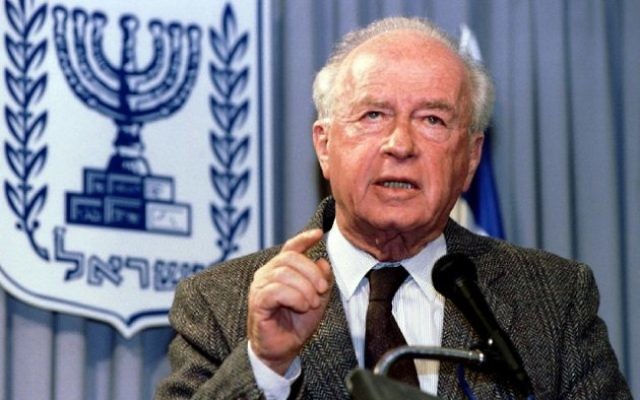Reflections on Rabin’s legacy
AS 100,000 people joined together in central Tel Aviv on Saturday to mark the 20th anniversary of the assassination of Yitzhak Rabin, community leaders in Australia reflected on the life and legacy of the slain prime minister.
AS 100,000 people joined together in central Tel Aviv on Saturday to mark the 20th anniversary of the assassination of Yitzhak Rabin, community leaders in Australia reflected on the life and legacy of the slain prime minister.
The Nobel laureate was shot dead at a peace rally on November 4, 1995, by Yigal Amir, a right-wing extremist who opposed the Oslo Accords.
Speaking to the crowd in Tel Aviv this week, former US president Bill Clinton, praised Rabin’s dedication to the peace process, and concluded with a call for Rabin’s efforts to be fulfilled.
The sentiment was echoed by President Barack Obama who said in a video address, “Like a true statesman, he [Rabin] was willing to exhaust every opening, every possibility for peace. In these difficult days, his life, his dream, can inspire us.”
Closer to home, Executive Council of Australian Jewry executive director Peter Wertheim stated: “Both in war and in peace, the life and work of Yitzhak Rabin pulsated within the beating heart of Israel and the Jewish people.”
Wertheim said it was Rabin’s success as a war leader that gave him the credibility and authority with friend and foe alike to pursue peace with Israel’s neighbours. “Like most Israelis, he sincerely wanted to reach a historic compromise to resolve the Israel-Palestinian conflict on the basis of two states for two peoples.”
Wertheim concluded, “He is remembered with respect and honour throughout the world, as a statesman with the conviction to pursue agonising compromises to secure the future of Israel.”
Zionist Federation of Australia president Danny Lamm said Rabin made a monumental contribution to the national security of the pre-1948 Yishuv and post-1948 state. “We will all draw our own conclusions as to how Rabin’s vision worked out in reality. But as one who was always sceptical of the Oslo process, I will say – with the greatest respect – that I believe Rabin possibly reluctantly succumbed to what Winston Churchill once described as the ‘triumph of hope over experience’.”
Australia/Israel & Jewish Affairs Council policy analyst Allon Lee described Rabin’s slaying as “the most traumatic day in recent Israeli history … Time may heal all wounds but this rupture is one sore that will weep for many years to come.”
Lee said assessing Rabin’s legacy without the long shadow of his murder affecting our judgment is not easy. “Inevitably, as Israel is no closer to peace than it was 20 years ago, his legacy is burdened by a slew of ‘what ifs’.
“There are some who argue that the chances for peace died with him. What would have happened had he lived is of course unknowable, but the record of his successors makes this claim doubtful.”
Lee added, “His legacy remains the same as when he died – a moral, courageous leader during wartime and one ready to take risks for peace. There is no better articulation of the meaning of the life of Yitzhak Rabin than that.”
Meanwhile, Dvir Abramovich, chair of the B’nai B’rith Anti-Defamation Commission hailed Rabin as “a fearless fighter” who “remained a man of peace”.
For full coverage, see this week’s AJN.
AJN STAFF


comments